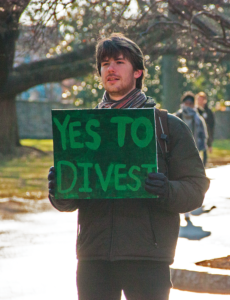
GU Fossil Free filed a proposal November 6 calling for divestment from tar sands oil companies.
A proposal by student group GU Fossil Free calling on the university to avoid investments in tar sands oil has received the support of about 200 members of the Georgetown community.
The proposal was submitted to the Committee on Investments and Social Responsibility, which advises the university on socially responsible investing policies, on November 6 . The CISR has received the proposal and is expected to discuss GUFF’s proposal at its next meeting, according to Rachel Pugh, the university’s senior director for strategic communications.
GUFF’s proposal argues that investments in tar sands oil extraction are inconsistent with the university’s Socially Responsible Investing policy, approved by Georgetown’s board of directors last June, which requires the university to take social and environmental impacts into account when making decisions concerning the university’s endowment investments. GUFF worked closely with administrators to establish the SRI last summer.
The greenhouse gas emissions associated with the process of extracting and refining tar sands oil are significantly greater than that of conventional crude oil, according to a 2009 report by the Department of Energy. Advocates argue that tar sands oil, primarily extracted in Alberta, Canada, contribute to climate change and environmental degradation in parts of Canada and the United States.
In its proposal, GUFF provided a list of 16 companies that receive most of their revenues from tar sands that Georgetown should avoid investing in.
The proposal is the latest divestment push for GUFF, which successfully lobbied the Board of Directors to divest the university’s funds from coal companies in 2015. The board also approved a student proposal to avoid direct investments in private prisons last month after three students submitted a broader proposal in January, bolstered by a three-month promotional campaign launched by the student group Georgetown University Forming a Radically Ethical Endowment.
The environmental implications of tar sands extraction make divestment from the industry a crucial step toward fulfilling Georgetown’s
commitment to social justice, according to Samantha Panchèvre (SFS ’19), a GUFF member.
“Georgetown is educating its students to be leaders in the world, to fight for a better political and social environment, and climate change is throwing all of that into disarray,” Panchèvre said. “So, by funding climate change, it’s very counterintuitive for an institution like Georgetown to fund climate change and also tell its students to go out and fight climate change.”
If CISR approves the proposal, it would be presented to the Committee on Finance and Administration within the board of directors for approval.
Pugh said the university takes non-investment proposals seriously.
“Georgetown University takes seriously matters related to social responsibility and its investments,” Pugh wrote in an email to The Hoya.
GUFF argues the production and refinement of tar sands oil in Canada and the United States is a social issue as well as an environmental one. The group’s proposal notes the extraction process damages tracts of land sacred to indigenous North Americans, and also contaminates their drinking water and harms animal populations culturally significant to the First Nations groups.
Proponents of the tar sands extraction process argue that tapping North America’s vast reserves could reduce the United States’ dependence on oil sourced from Middle Eastern states.
GUFF member Celia Buckman (SFS ’21) said the university has a moral obligation to divest from an industry with such environmental and social problems.
Panchèvre said GUFF enjoys a close relationship with administrators after having worked closely with the administration to develop the SRI.
“We’ve had a really good relationship with administrators, and I think that’s evident by the passing of the Socially Responsible Investment Policy. We had one-on-one meetings with administrators,” Panchèvre said.
GUFF argues in its proposal that Georgetown cannot negotiate a change in tar sands oil companies’ production strategies or policies to make investment morally acceptable. At the heart of the unchangable problem are the production methods and products themselves, not the company policies, according to Buckman.
GUFF’s push for divestment from tar sands oil is a part of its greater effort to end Georgetown’s investment in fossil fuels, Buckman said.
Universities and institutions in both the United Kingdom and the United States have divested from tar sands oil, including Oxford University, the University of California system and the Church of England in 2015,and Boston University and Cambridge University in 2016.
Panchèvre said accepting the proposal would reaffirm Georgetown’s support for environmentally conscious policies.
“It’s just good press for Georgetown. It’s really a no-brainer,” Panchèvre said.




















